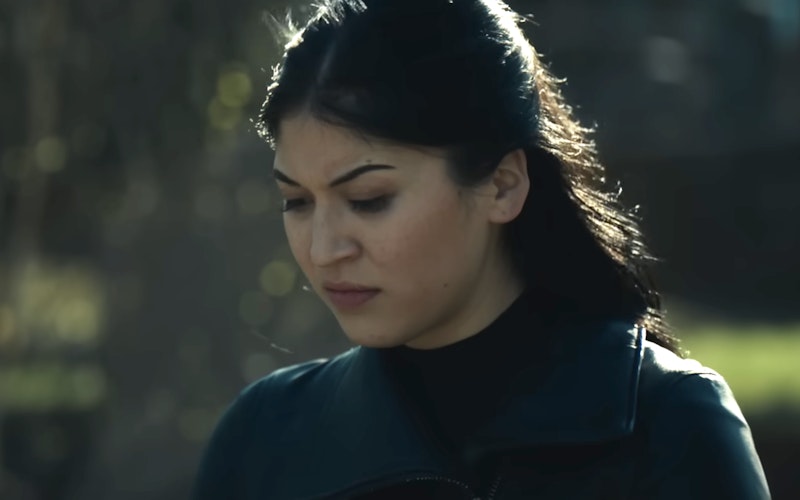
TV
Echo and Spiritual Ancestors
Whether you’re an ardent fan of the Marvel Cinematic Universe or not, Echo cries out for our attention. The Disney Plus series declares that we are connected in our kinship in more ways than we think.
The breakout star of Echo is Alaqua Cox. She plays Maya Lopez, a member of the Choctaw Nation and the MCU’s first indigenous superhero. In her youth, Maya’s family was torn apart after the death of her mother in a brutal car crash. Afterwards, her father (Zahn McClarnon) separates Maya from her family and from her Choctaw roots when he moves them to New York City. Eventually, her father finds work within the criminal empire of Kingpin (Vincent D’Onofrio).
When Maya’s father is murdered, Kingpin adopts Maya. She takes to Kingpin’s tutelage and is drawn to his violent means. In a flashback, however, Maya discovers that Kingpin is responsible for her father’s death. She proceeds to put a bullet in Kingpin’s head, but he survives. In her haste, Maya flees from New York City and returns to Tamaha, Okla., returning to her estranged family on the Choctaw reservation.
This dual-world, dual-identity clash of values is where the majority of Maya’s inner conflict takes place. Her return has left her confused and alone. Echo’s visuals represent this clash well, repeatedly transitioning from flashbacks of the cold and confined gray drabness of New York to the lush greens and open countryside of the Oklahoma plains. Being back home and reconnecting to her roots awakens Maya’s senses. She begins seeing visions of her ancestors: a legendary matriarch emerging from the ruins of a collapsed cave; a ferocious gunslinger on horseback defending the prairie; visions of her mother, with whom she’s able to converse.
Maya is confused as to what these visions mean until she meets with her maternal grandmother, Chula (Tantoo Cardinal). “What you’re describing,” explains Chula. “It’s what I saw on the night I gave birth to your mother. . . . I could hardly say they were always with me. They had an ability to know when they were truly needed. . . . There’s a unique connection. I think generations are echoing, reaching out to us at a time when we need them the most.” Chula explains that the strength and skills of her ancestors will extend to Maya as she fights for her people and defends her family.
This kind of ancestral connection, especially when viewed in the context of mysticism and magical realism, may cause trepidation for Christian viewers. But is it so outrageous to believe that our ancestors have direct bearing on our faith and spirituality?
Is it so outrageous to believe that our ancestors have direct bearing on our faith and spirituality?
A current snapshot of Western Christian spirituality reveals that we lean more individualistic than any other period of Christendom. In doing so, any theology that encroaches on individual faith and personal liberty—especially when it’s a dynamic that is represented in non-majority culture—may be feared as secular or pagan. But the Bible is steeped in community and a shared interconnectedness that extends beyond a modern Western understanding. For the followers of God in both the Old and New testaments—and even for God himself—there are many instances when there is no distinction between the actions of individuals and the actions of the whole community.
In Joshua 7, God's anger burned against the entire community over Achan’s indiscretion. The same can be said of Ananias and Sapphira in Acts 5. Circumcision in the Old Testament brings a child into the covenant family with no prior awareness of faith. The Apostle Paul proclaims salvation to his jailer and to the jailer’s entire household. Throughout the Bible, there is a connection between individuals and their respective kinship and community, one that causes us to stretch our modern understanding of a “personal” faith. We are connected, no doubt.
Furthermore, our entire faith is built upon a spiritual ancestor bestowing eternal welfare and benefits to his kin throughout the generations. The Apostle Paul writes in Romans 5: “For if, by the trespass of the one man, death reigned through that one man, how much more will those who receive God’s abundant provision of grace and of the gift of righteousness reign in life through the one man, Jesus Christ!” Christ’s ancestral imputation is a non-negotiable foundation of our faith.
Echo demonstrates something like this kinship. In the season’s final episode, Maya has a vision in which she speaks with her mother, who reassures her, “You aren’t alone. All of us that came before are a part of you. Because we echo through you.”
We echo through you. I like that. In Hebrews, we are told that we are surrounded by a “great cloud of witnesses.” We are linked, bound together. Our Christian ancestors echo through us, just as Christ echoes through me.
Topics: TV